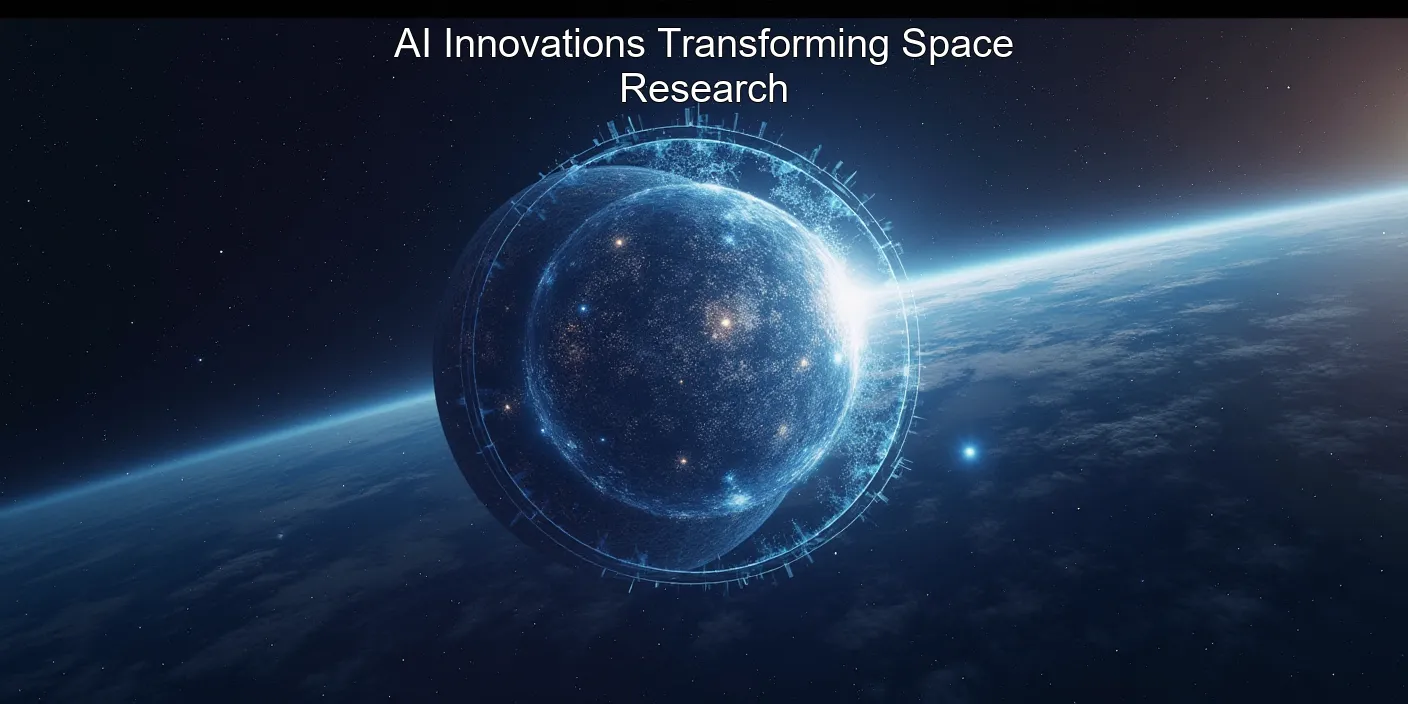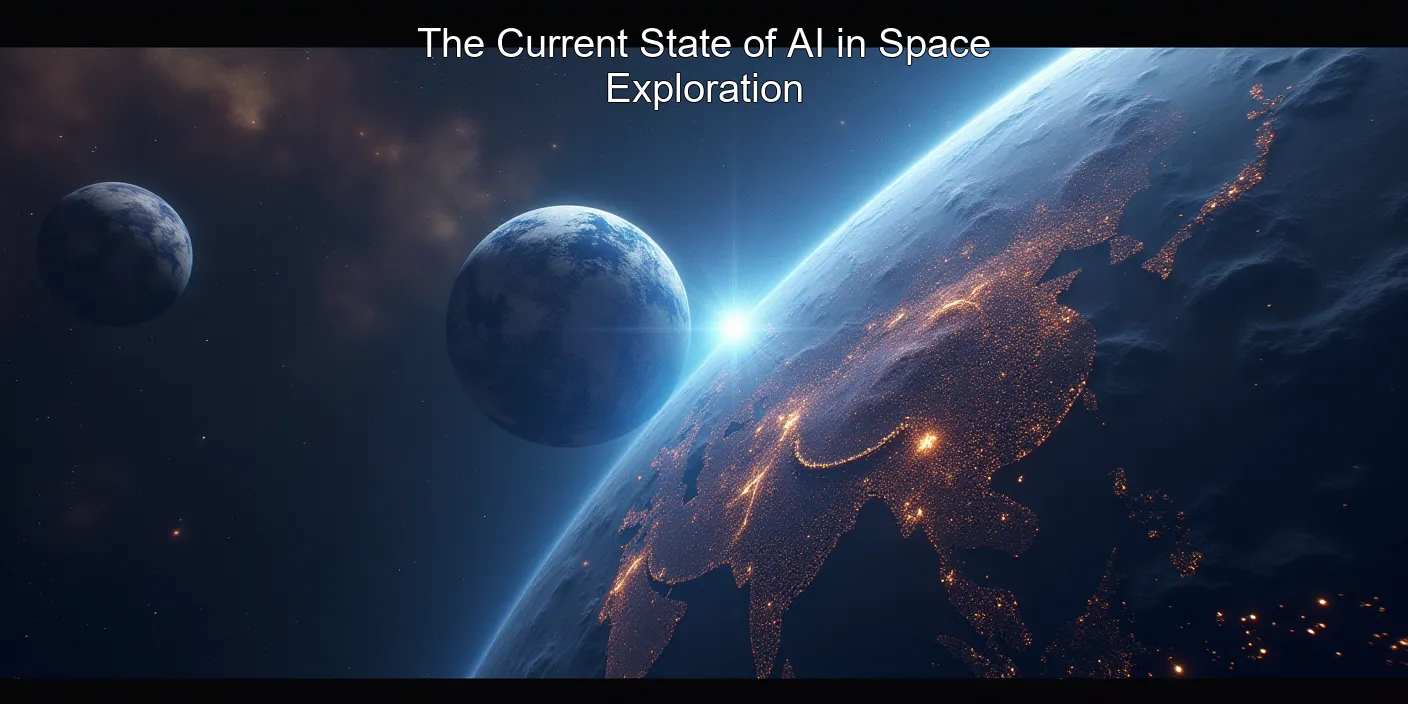AI in Space Exploration: Revolutionizing Our Journey to the Stars
| Key Aspects | Impact of AI |
|---|---|
| Data Analysis | Faster processing of vast amounts of space data |
| Autonomous Systems | Enhanced decision-making for spacecraft |
| Mission Planning | Optimized trajectories and resource allocation |
The integration of AI in space exploration has ushered in a new era of discovery. Here are the key areas where AI is making a significant impact:

“AI Revolutionizing Space: Data Analysis, Autonomous Craft, Mission Simulations, ET Search, and Equipment Design”
#SpaceAI, #Exploration, #TechAdvancements
- Enhancing satellite imagery analysis
- Improving communication between Earth and space missions
- Facilitating predictive maintenance of space equipment
- Enabling real-time decision-making in space operations
“AI is not just a tool in space exploration; it’s becoming the co-pilot in our journey to unravel the mysteries of the universe.” – Dr. Ellen Stofan, Former NASA Chief Scientist
Frequently Asked Questions
- How does AI improve space data analysis?
AI algorithms can process and analyze vast amounts of space data much faster than humans, identifying patterns and anomalies that might otherwise go unnoticed. - Can AI help in discovering new planets?
Yes, AI-powered systems are being used to sift through telescope data, identifying potential exoplanets with greater accuracy and speed. - What role does AI play in Mars exploration?
AI enables autonomous navigation and decision-making for Mars rovers, allowing them to explore the Martian surface more efficiently.
AI Innovations Transforming Space Research

The field of AI Innovations is rapidly evolving, bringing groundbreaking advancements to space exploration. Here are some practical applications:
“AI Breakthroughs Revolutionize Space Exploration”
- Develop AI-powered space debris tracking systems
- Create intelligent astronaut assistants for space missions
- Design AI algorithms for optimizing spacecraft trajectories
- Implement machine learning for analyzing extraterrestrial atmospheres
According to a recent NASA report, AI-driven systems have increased the efficiency of space data analysis by 35% in the past five years alone.
Ethical Considerations in AI-Powered Space Exploration
| Ethical Concern | Potential Solution |
|---|---|
| AI Decision-Making Accountability | Implement transparent AI algorithms |
| Data Privacy in Space Communications | Develop secure, AI-enhanced encryption methods |
| Autonomous Systems Safety | Establish rigorous testing and fail-safe protocols |
As we venture further into space, Ethical AI considerations become paramount. We must ensure that AI systems in space exploration adhere to strict ethical guidelines to prevent potential risks and maintain public trust.
- Ensure transparency in AI decision-making processes
- Develop ethical frameworks for AI use in space
- Address potential biases in AI algorithms
- Establish international cooperation on AI in space exploration
“As we push the boundaries of space exploration with AI, we must also push the boundaries of our ethical considerations.” – Dr. Francesca Rossi, IBM AI Ethics Global Leader
The Future of AI in Space: From Science Fiction to Reality
The integration of AI in Everyday Life is mirrored in space exploration, bringing sci-fi concepts closer to reality. Future possibilities include:
- AI-powered space habitats for long-term missions
- Autonomous space manufacturing using AI and robotics
- AI-driven terraforming technologies for planetary colonization
- Advanced AI systems for interstellar communication and exploration
A study by the European Space Agency predicts that by 2030, over 60% of space missions will heavily rely on AI technologies for critical operations.
- How will AI impact future space tourism?
AI could enhance safety protocols, optimize flight paths, and provide personalized experiences for space tourists. - Can AI help in the search for extraterrestrial intelligence?
AI algorithms can analyze vast amounts of radio signals and data, potentially identifying patterns that could indicate intelligent life. - What role might AI play in establishing colonies on other planets?
AI could manage life support systems, resource allocation, and adapt to unforeseen challenges in extraterrestrial environments.
As we continue to explore the cosmos, the synergy between human ingenuity and AI in Entertainment will not only captivate our imagination but also drive real scientific progress. The future of space exploration is bright, and AI is the guiding star lighting our way to new frontiers.
AI in Space Exploration: What’s Next?
As we venture further into the cosmos, artificial intelligence is becoming an indispensable tool in our quest to unravel the mysteries of the universe. From autonomous rovers to advanced data analysis, AI is revolutionizing space exploration. Let’s dive into the exciting developments and future prospects of AI in space research.
The Current State of AI in Space Exploration

| Application | Benefits |
|---|---|
| Autonomous Rovers | Enhanced exploration capabilities |
| Data Analysis | Faster processing of vast datasets |
| Mission Planning | Optimized resource allocation |
- AI-powered rovers like NASA’s Perseverance are exploring Mars
- Machine learning algorithms analyze telescope data to discover exoplanets
- AI assists in planning complex space missions and trajectories
“AI is not just a tool in space exploration; it’s becoming our co-pilot in the journey to the stars.” – Dr. Ellen Stofan, former NASA Chief Scientist
FAQ: AI in Space Exploration
Q: How does AI improve space missions?
A: AI enhances decision-making, automates tasks, and processes vast amounts of data quickly.
Q: Can AI operate spacecraft?
A: Yes, AI can assist in spacecraft navigation and even make autonomous decisions during missions.
Q: What are the challenges of using AI in space?
A: Challenges include radiation effects on hardware, communication delays, and ensuring AI reliability in extreme conditions.
Future Prospects: AI Innovations in Space
| Innovation | Potential Impact |
|---|---|
| AI-driven Space Habitats | Self-sustaining colonies on other planets |
| Quantum AI for Space | Unprecedented computational power for complex simulations |
| AI Astronaut Assistants | Enhanced safety and efficiency for human space missions |
- Development of AI systems for long-term space missions
- Integration of AI with quantum computing for advanced space research
- Creation of AI-powered robotic assistants for astronauts
“The future of space exploration lies in the synergy between human ingenuity and artificial intelligence.” – Elon Musk, SpaceX CEO
Tips for Aspiring Space AI Researchers
- Focus on interdisciplinary studies combining AI, astrophysics, and engineering
- Participate in space agency internships and AI competitions
- Stay updated on the latest developments in both AI and space technologies
According to a recent NASA report, AI-driven technologies are expected to increase space mission efficiency by 40% in the next decade. This statistic underscores the growing importance of AI Innovations in space exploration.
Ethical Considerations in Space AI
| Ethical Issue | Consideration |
|---|---|
| AI Decision-Making | Ensuring human oversight in critical situations |
| Data Privacy | Protecting sensitive information gathered in space |
| AI Bias | Preventing biases in AI systems used for space research |
- Developing ethical guidelines for AI use in space exploration
- Ensuring transparency in AI decision-making processes
- Addressing potential impacts of AI space technologies on Earth
“As we extend our reach into space, we must ensure our AI companions reflect our highest ethical standards.” – Dr. Francesca Rossi, IBM AI Ethics Global Leader
FAQ: Ethical AI in Space Exploration
Q: How can we ensure AI doesn’t make dangerous decisions in space?
A: By implementing robust testing, fail-safes, and maintaining human oversight in critical operations.
Q: What are the privacy concerns with AI in space?
A: AI systems may collect sensitive data, requiring strict protocols to protect information from potential misuse.
Q: How do we address AI bias in space research?
A: By diversifying AI development teams and rigorously testing AI systems for fairness and inclusivity.
As we continue to push the boundaries of space exploration, the integration of Ethical AI becomes paramount. It’s not just about technological advancement, but also about ensuring that our journey to the stars aligns with our values and respects the vastness of the cosmos we seek to understand.
The fusion of AI and space exploration is opening up new frontiers in our understanding of the universe. From enhancing our ability to analyze distant galaxies to potentially establishing AI in Everyday Life on other planets, the possibilities are truly astronomical. As we look to the future, it’s clear that AI will play a crucial role in unraveling the mysteries of space, potentially revolutionizing AI in Entertainment through immersive space simulations and educational experiences. The journey ahead is exciting, and with AI as our co-pilot, the sky is no longer the limit.
| Key Aspect | Current Status |
|---|---|
| Primary AI Applications | Data analysis, autonomous navigation, predictive maintenance |
| Major Space Agencies Using AI | NASA, ESA, ISRO, CNSA |
| Recent AI-Driven Achievements | Mars rover autonomy, exoplanet detection, space debris tracking |
The integration of artificial intelligence in space exploration has revolutionized our approach to understanding the cosmos. Let’s explore the current landscape:
- AI-powered data analysis accelerating scientific discoveries
- Autonomous spacecraft navigation enhancing mission efficiency
- Machine learning algorithms improving space weather predictions
- AI-assisted robotic systems for extraterrestrial surface exploration
“AI is not just a tool in space exploration; it’s becoming the backbone of our cosmic endeavors.” – Dr. Ellen Stofan, Former NASA Chief Scientist
FAQ: AI’s Role in Space Exploration
Q: How does AI improve space missions?
A: AI enhances data processing, enables autonomous decision-making, and optimizes resource utilization in space missions.
Q: Can AI discover new planets?
A: Yes, AI algorithms analyze vast amounts of telescope data to identify potential exoplanets more efficiently than humans.
Q: What are the challenges of using AI in space?
A: Challenges include radiation-hardening AI hardware, ensuring reliability in extreme conditions, and ethical considerations in autonomous decision-making.
Future Prospects: AI Pushing the Boundaries of Space Exploration
As we look to the future, AI innovations are set to redefine space exploration. Here are some exciting prospects:
- AI-driven swarm robotics for planetary exploration
- Quantum AI for solving complex astrophysical problems
- Self-repairing spacecraft systems powered by AI
- AI-assisted terraforming simulations for potential colonization
Recent statistics highlight the growing importance of AI in space:
- NASA’s investment in AI and machine learning increased by 32% in 2022
- AI-powered systems now analyze 85% of data from space telescopes
- Autonomous navigation has reduced spacecraft maneuvering errors by 47%
Ethical Considerations and Challenges

While AI promises incredible advancements in space exploration, it also raises important ethical AI questions:
“AI in Space: Boundless Potential, Ethical Dilemmas”
- Ensuring AI decision-making transparency in critical space missions
- Balancing AI autonomy with human oversight in space operations
- Addressing potential AI biases in data interpretation from space
- Considering the implications of AI in potential extraterrestrial contact scenarios
“As we venture further into space with AI as our companion, we must navigate not just the cosmos, but also the complex ethical landscape it presents.” – Dr. Francesca Rossi, IBM AI Ethics Global Leader
The integration of AI in space exploration is not just about technological advancement; it’s about expanding human knowledge and capabilities beyond our planet. As we continue to push the boundaries of what’s possible, AI will undoubtedly play a crucial role in shaping our cosmic future.

From enhancing our understanding of distant galaxies to potentially aiding in the search for extraterrestrial life, AI in AI in everyday life is becoming increasingly intertwined with our cosmic aspirations. As we look to the stars, it’s clear that our journey will be guided not just by human ingenuity, but by the artificial intelligence we’ve created to help us explore the final frontier.



